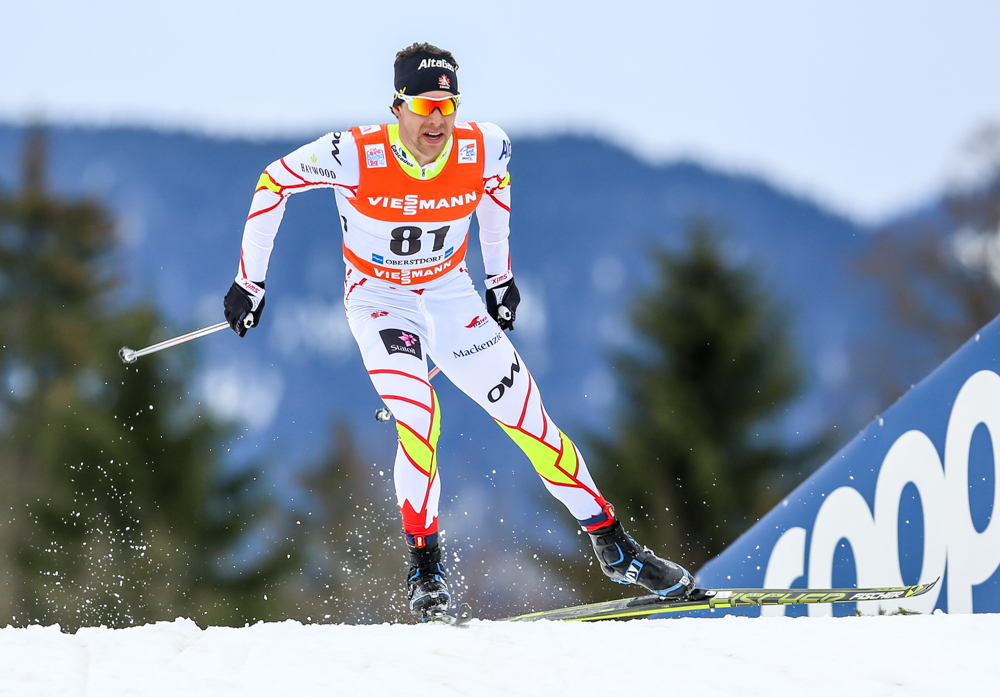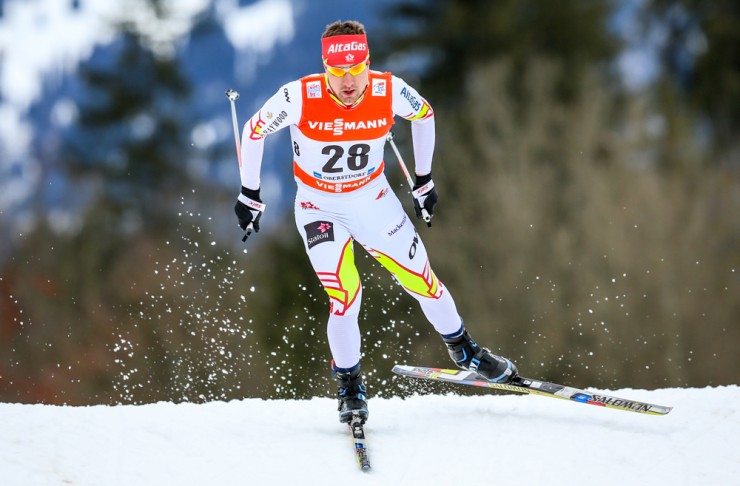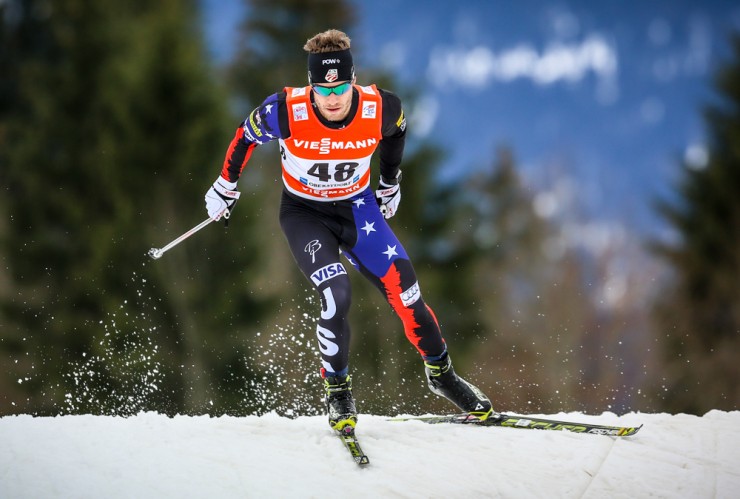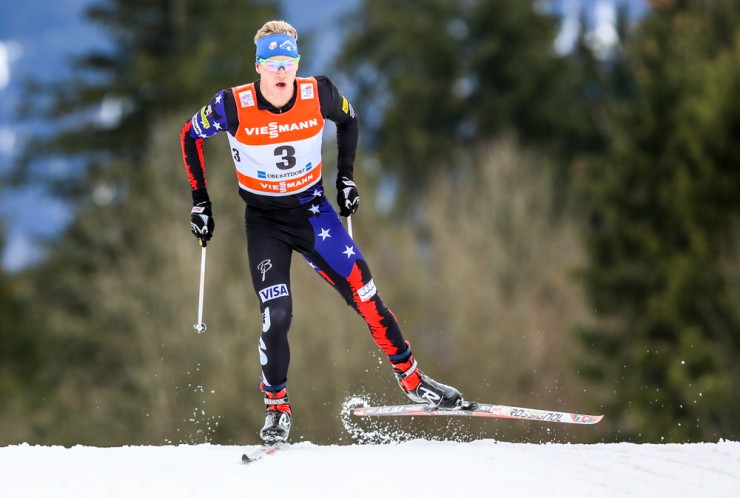
It wasn’t a win like last year, but Canadian Alex Harvey had a respectable start to the 2015 Tour de Ski (TDS) on Saturday, finishing 13th in the 4.4 k freestyle prologue in Oberstdorf, Germany.
Sochi gold-medal winner Dario Cologna of Switzerland won the stage in a time of 9:54.2, while the 26-year-old Harvey ended up 14.6 seconds back.
“I felt good in the warm-up today and was happy with the race,” Harvey told Cross Country Canada (CCC) in a press release. “I haven’t quite found my groove in skating this year, but it is coming and today was a sign of that.”
Harvey has an impressive résumé in prologues, having won last year’s TDS prologue and a World Cup prologue at the 2012 World Cup Finals in Falun, Sweden. He was in seventh place after the first lap on Saturday, but lost ground on the second lap, and said the race being 600 meters longer than normal along with three big climbs proved to be a struggle.

“It was a little more difficult and you could really feel it in the end,” he explained.
Meanwhile, the other Canadian men placed in the middle of the pack. After finishing the first lap in the 74th position, Devon Kershaw skied a strong second lap to finish 47th (+33.1). Lenny Valjas finished 51st (+34.8), weeks after an impressive showing in World Cup sprints in Davos, where he finished 10th and 18th in two consecutive weeks. Ivan Babikov was 57th (+36.6) after clocking through the first lap in 86th.
“Not the best start of the Tour for me, but that’s just a beginning,” Babikov tweeted following the race.
Kershaw was disappointed with Saturday’s result. Last season, he placed second behind Harvey in the opening competition of the Tour.
“Prologues suit me very well, and to finish mid-pack in a race that should be a strength isn’t where I want to be,” Kershaw wrote in an email. “That said, the second lap was better than the first.”
The 32 year old explained that he had a difficult first lap, adding that the “snappiness and power” he had felt all week eluded him from the start and made him rely on technique rather than power to stay in the race.

“I was a bit lucky that the race ended up being slightly longer than most prologues are – to ski my way back into it a little bit,” he wrote.
However, Kershaw is optimistic about having good races in the Tour, adding that his plan is to begin skiing with more confidence while focusing on a smoother, more-effective technique. He hopes he can put together a race based on how he has felt throughout the last week.
“This was a good opportunity lost, but there’s more to come,” he wrote.
No Canadian women competed in the opening prologue.
Hamilton Scores First Distance Points
The U.S. men were led by, in some ways, an unlikely face: Simi Hamilton had the best distance result of his career, finishing 26th, 23.5 seconds behind Cologna, and scoring his first distance points.
“I’m definitely psyched,” Hamilton wrote in an email. “I think that prologues generally ski a little more like sprint qualifiers than they do distance races, but the course here was extremely hard and on the longer side, so it feels good to have a decent ‘distance’ race under my belt this year. I knew that pacing it well was pretty key, and I mostly just focused on skiing a smooth and relaxed first lap and then gradually increasing my effort throughout the second lap.”

Just as the American men were led by a sprinter in a “distance” race, the women had been led, early on, by distance specialist Liz Stephen in a race much shorter than those where she usually excels. Watching Stephen and Sadie Bjornsen, who finished eighth and seventh, respectively, as well as Jessie Diggins in 14th and Kikkan Randall in 22nd, gave Hamilton a little boost to believe that anything might be possible.
“The girls’ strong performances were definitely a motivating factor, and I knew that our skis were running really well… our techs did a great job dialing things in,” he wrote.
Erik Bjornsen was the next American, placing 48th, 11 additional seconds back, and Andy Newell finished 82nd.
For Hamilton, it was good to simply feel good. He sat out the second-to-last weekend of racing in period one, skipping a skate sprint in Davos, Switzerland, because he caught a virus. He wrote that he hadn’t realized how much it took out of him. Spending the holiday break in Davos, he was able to train and rest and explained he now feels like he’s back to 100 percent.
“We’ll see what tomorrow brings, but I don’t have any huge expectations,” he wrote of the upcoming 15 k classic pursuit. “I think that if I stay relaxed I have a chance of having a good race, but with such a strong field on a hard course we’ll just have to see. With that said, I’m excited to race again and I’m hoping that I can continue to carry some good momentum into the sprint on Tuesday.”
Tuesday: the sprint in Val Müstair, Switzerland, is the third race of the tour. Last season Hamilton collected his first-ever World Cup victory in the Tour de Ski sprint, that time held in Lenzerheide, Switzerland. He has never raced in Val Müstair (not coincidentally, Cologna’s hometown) before, but he’s pretty ramped up for the sprint. It’s the focus of his Tour.
“I think I’ll always feel a little bit of pressure after having such a good sprint during the Tour last year, but ski racing is ski racing and the only thing that is in my control is showing up on Tuesday, going all out, racing smart, and believing in my ability to ski fast,” he wrote. “I haven’t raced in Val Mustair before, but I’ve heard that it’s a great course and we’re hopefully looking at a good weather forecast that will setup the course fast and hard. I’m definitely very excited for it.”
Hamilton plans to compete in the first distance race in Toblach, Italy (the Tour’s fourth stage), then reevaluate. He’ll likely drop out at that point to stay fresh for sprint racing at the next two World Cup weekends after the Tour concludes.



